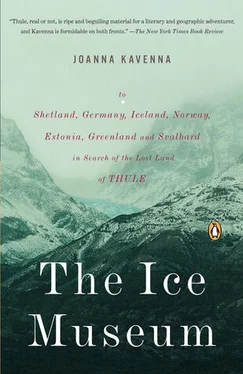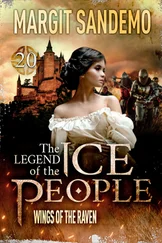‘It’s a nice photograph,’ I said, because I could think of nothing else to say, and Gunvor took the photograph back and put it carefully away again.
‘My neighbours bring their children home from school round about now,’ she said. ‘And you know, they don’t know about my past at all.’
‘Surely now it would be OK to tell them?’
‘Yes, perhaps,’ she said. ‘But I came here so long ago, and I never told anyone. It would seem strange to tell them now. They would feel I had hidden it from them for so long. To a close friend, I might tell it, but I have never come to know my neighbours very well,’ she said.
I imagined the loneliness of concealing the past from your neighbours, after all these years. Yet Gunvor insisted that she had been one of the lucky ones. She had ended up in a pleasant house, in a quiet northern town. It wasn’t where she came from, she said, but she didn’t want to name her hometown. ‘I would feel bad for the people who shunned us; I don’t want to point a finger at them. They were just doing what everyone did at the time. It’s a pressure, to be the same. There were people much worse off than me, I could tell you terrible stories. A friend I now know, another krigsbarn , he was in children’s homes for all his life, he was never taught to read properly, he can’t speak a word of English. He was bullied and maltreated. He worked as a janitor, and has lived in poverty. These people were failed by the system. They were innocent, they were only children, anyone should have pitied them, but the state hated them, thought they were tainted by their genes.’
For years after the war, the state failed to intervene in the guilty maltreatment of the krigsbarn , taking its lead from the medical establishment. In the haggard world after the war, children were blamed for the actions of the Nazis, for the actions of their parents. The children were punished by a society that could hardly bear to remember.
Later, I said goodbye to Gunvor as we stood in her hallway. She was used to people not liking her, she said, and it was always odd to meet new people. I had found I liked her a great deal, with her nervous hospitality, her cakes and coffee and her accelerated speech. I admired her for her lack of self-pity, even as I suspected that her briskness might be a veneer.
She shut the door, quite sharply, as if she was glad it was over.
At Kirkenes I had picked up a car, driving it out of the town through the green forests and silver lakes, along a silent road to the east. The rocks were stacked up along the road. Nothing moved on the ridges. I arrived without noticing it in Karasjok, a small village by the Finnish border. I stopped the car, slammed the door, and walked around, ducking into a supermarket where everyone was buying hats and gloves, because the wind was growing harsher and more persistent by the hour. When I walked, I noticed I was swaying slightly from the sea voyage. The wind was trying for an early winter, tugging the leaves from the trees, landing them in piles. The countryside lay ragged and beautiful around the village, with the sun shining in a pale sky. I arrived at a wooden building, like a pine palace. Planks of pine, drawn into a curved wall, with props of pine set between them. Everything smelt of pine; the palace seemed to be new.
I had arranged to meet Pal outside the palace, and he was waiting, a small man, wearing a bright red-and-blue tunic, with a multi-coloured hat, like a jester’s. He had a sword tied to his belt.
‘We were never Aryans,’ he was saying. ‘But our ancestors were in these regions for thousands of years, even before the Nordic tribes came, we think. Tacitus wrote about Fenni, but we think it was us all right. For a while the Scandinavian governments pretended we didn’t exist, but they were so ashamed after the war, things got better for us.’
He rattled his belt, and for a moment I thought he might draw his sword, but he was looking for something else. He took out a key, and moved towards the pine door of the pine palace.
‘This,’ he said, pushing the door open, with a flourish, ‘is the Parliament of the Sámi. You are more likely to have heard us called the Lapps, but we decided we didn’t like that name.’
The entrance hall was full of lights and splashy paintings in bright colours hanging down the wooden walls. In glass cases they had stored a significant piece of fish skin, a significant piece of reindeer hide. There were rows of books and papers, and a few Sámi in bright tunics, sitting behind desks.
Pal offered a quick tour of the Parliament, taking in the president and a few other sights in the place. He had worked in the Parliament for a few years, he told me, since it was opened. The Parliament was made up of corridor after corridor of perfect pine, leading into large light meeting rooms, painted vivid colours. The Sámi, Pal was saying, were a quiet non-Aryan people, blanched out by the Nazis in their Nordic fetish. Blanched out by the Scandinavian governments for years. The Sámi, or people a little like the Sámi, Pal wasn’t quite sure which, had appeared in ancient accounts, called the Wildlappmanni, Scrithifini, Scritobini, Screrefinni. They hunted through the forests and across the mountains. They appeared in early writings on the north, in Tacitus, in Procopius, later in the medieval clerics, who made up wild fantasies and entwined them with contemporary knowledge. They ate nothing but the flesh of animals, they couldn’t sew, tying skins together with sinews. They slung their babies over the branches of trees, so the women could go to the hunt. These early Sámi were a curiosity for centuries, with their strange magic, something called gam, and their cloudy history, mixed up with fables and fantasies. Close to the land of the Scrithifini or the Scritobini, or the Finni, was an abyss of water, claimed the fanciful writers, called Ocean’s navel, which twice a day sucked the waves down and spewed them out again. There were crazier rumours still, trickling through clerical pens, that the Scrithifini lived near to the women with beards, and the Amazons, and the Cynocephali, and the Cyclopes.
They had been ignored, said Pal, and suppressed for a while, by Scandinavian governments wound up on patriotic slogans. But they had a good claim to being the most ancient people in the north. ‘It’s not a claim we’d make,’ Pal was saying, ‘and anyway we don’t believe in the ownership of land. Mother Earth cannot be owned by humans,’ he said devoutly.
The Sámi never had a certain land; they hardly recognized the national borders of the countries they lived in. They had herded reindeer through generations around the northern reaches of Scandinavia. Lapland was a region in the north of Finland, but there was a larger region of Sámiland, real to the Sámi, stretching across the north of the Scandinavian countries, but hardly represented by lines and divisions on the maps. It was a land unacknowledged, an informal homeland for them.
The President appeared, a small man with dark hair holding his sword like a pen, and he said he had to rush to a meeting but he knew that the Sámi were the earliest inhabitants of the north, he was quite convinced, and though there was no such thing as membership of land it was unpleasant to be sitting in the Parliament with no power at all. They had no power, no money, said the President, they needed a lot more money, and significantly more power, and the pipelines and oil wells that everyone kept building in the northern regions were not his idea of a nature-friendly use of the land. In Western society, he said, everyone was always talking about development, about money, but the Sámi had a different sense of things.
‘You know,’ he added, after a pause, ‘we are not bitter about the past.’
Читать дальше












